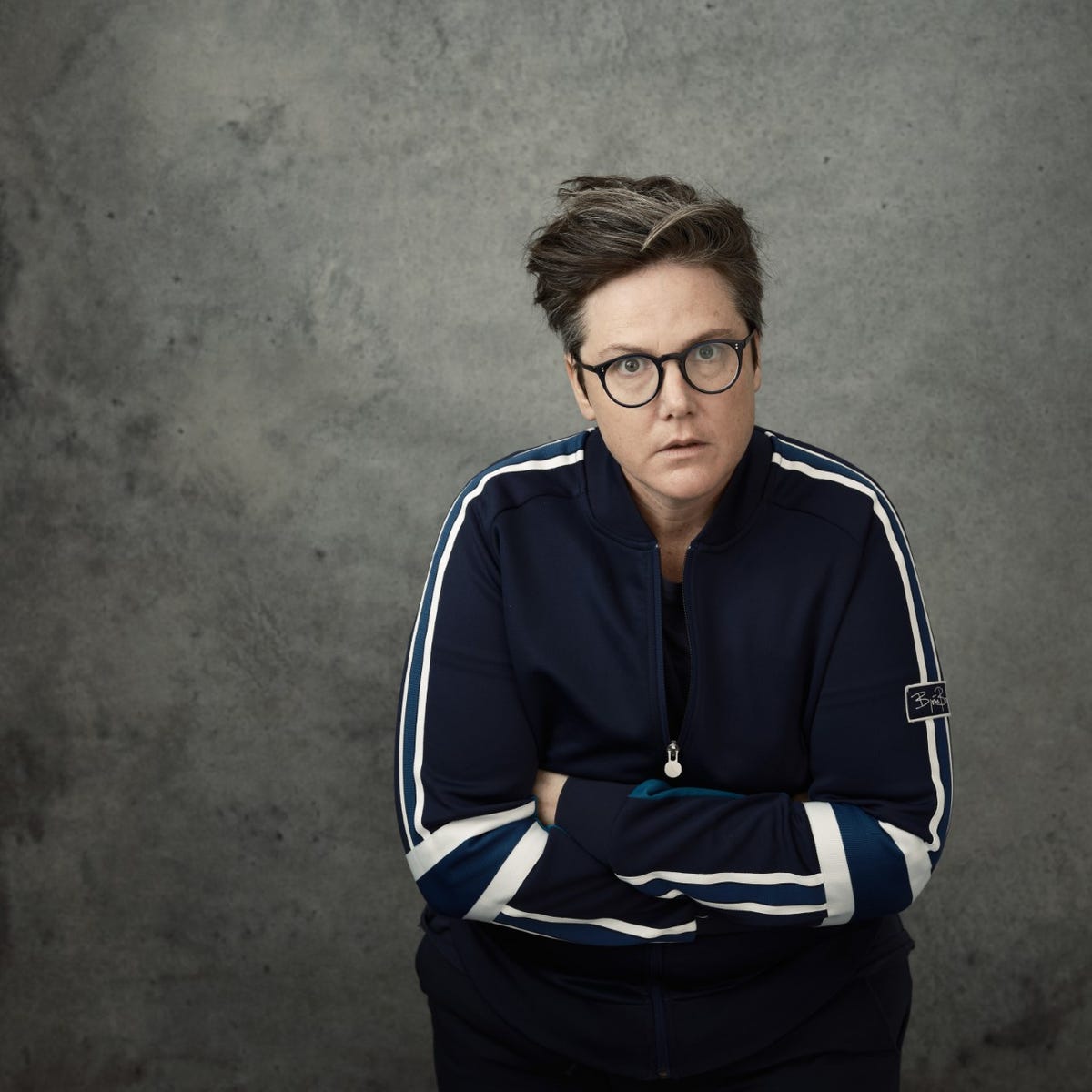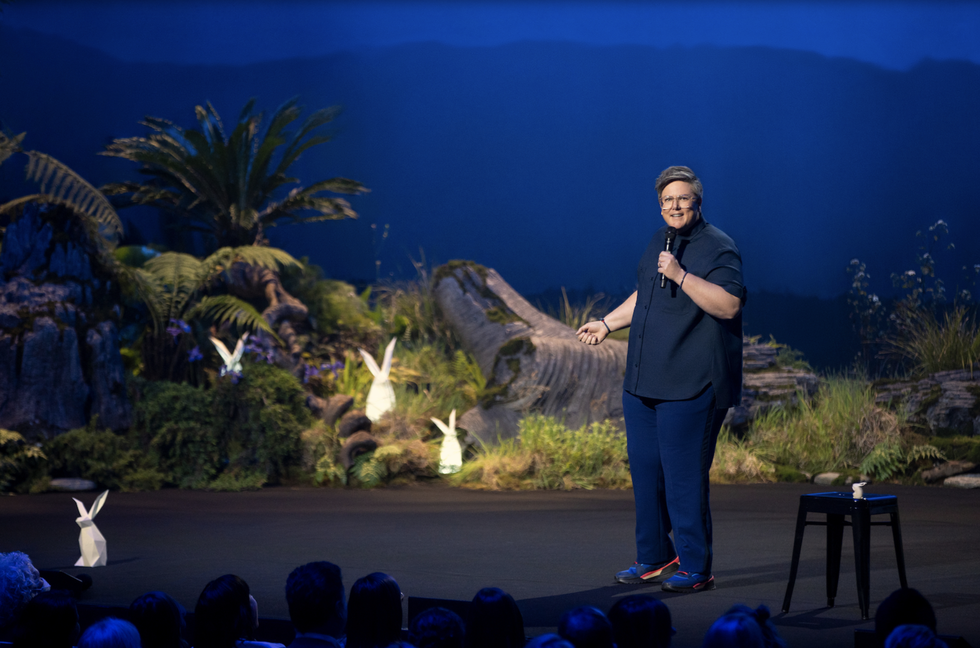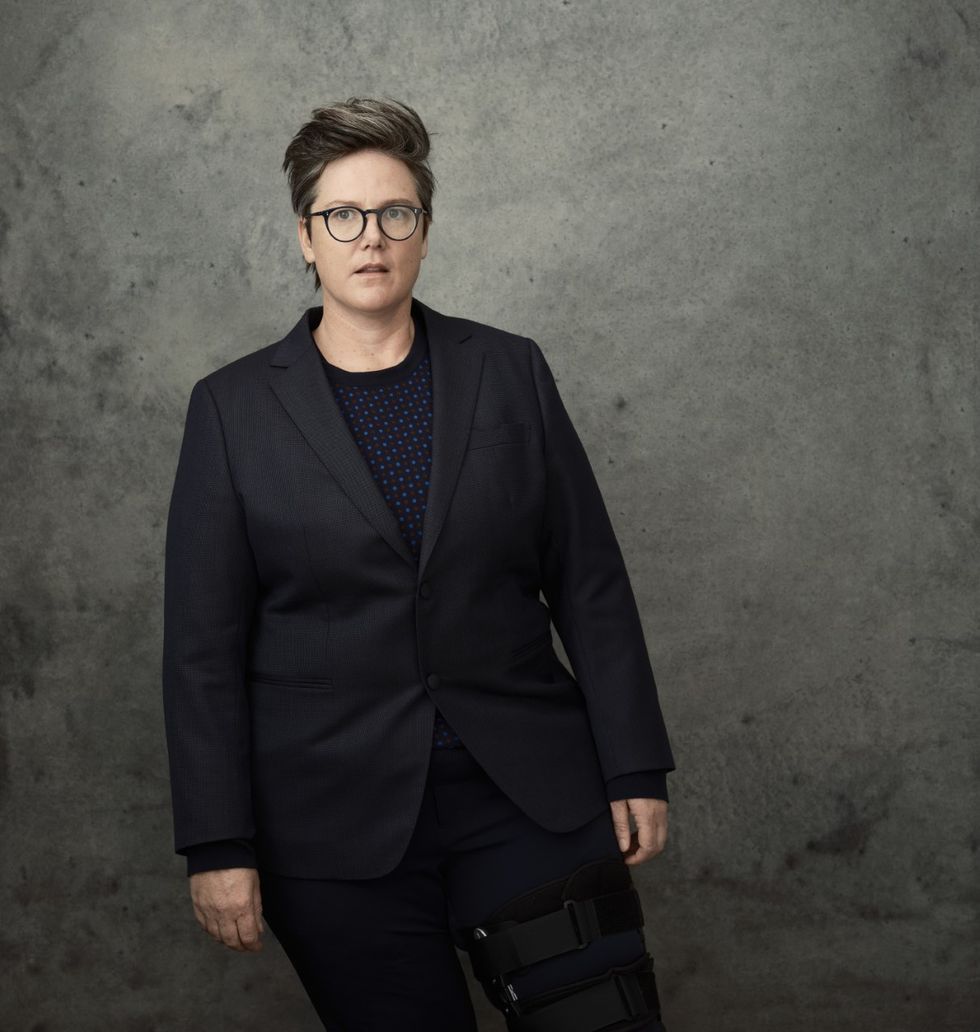Hannah Gadsby wasn’t gunning for fame, but it came for them anyway. The comedian’s paradigm-shifting Netflix special, Nanette, went viral in 2018, rocketing Gadsby into an orbit of celebrity that, to this day, they cannot process. “I genuinely don’t understand this world,” Gadsby, 45, tells me over a recent evening Zoom call from their home in Melbourne. They look bewildered, like a dog in space, as they try to square the person they were before Nanette with the star they have since become. Gadsby worries that fame will turn them into a “bad apple.”
“It does things to people’s brains,” Gadsby says, recalling a time on set when “some rich white lady said, ‘It’s really hard being a mother and an actress.’” The comment struck Gadsby as clueless. “You don't do anything for yourself on set,” Gadsby tells me. “It's really nice. They just go, ‘You eat now.’” At the same time, Gadsby recognises that they now have the kind of privilege that affords such cluelessness. The realisation has put them in an existential tailspin. The way Gadsby sees it, they have two options: fight like hell against fame’s insistent tug toward out-of-touch aloofness; or go “the Gwyneth Paltrow road.” Embrace delusion and say things like, “It's actually really hard having four skiing instructors,” Gadsby deadpans, before clarifying, “I don’t think she’s lying!”
As much as Gadsby thinks their slow transformation into Gwyneth Paltrow would make for “interesting performance art,” they concede it’s unlikely to happen. Still, how do you stay in the fight, remain a voice for the marginalised, when you yourself are no longer suffering? The question looms over Gadsby as they gear up to release their third Netflix special—a feel-good show titled Something Special, streaming on 9 May. In our current global clusterfuck, what's more alienating and unrelatable than having things go pretty great for you? As Gadsby anxiously explains: “I hit safety, and the world fell apart. Now I’m part of the problem!” But from where I sit on the other side of the world, staring at Gadsby hunched forward in a tall, crimson reading chair positioned in the corner of a dimly lit living room, what I see is a world-weary comedian who will never stop punching up.
Hannah Gadsby grew up the youngest of five children in Smithton, Tasmania. They studied art history and spent their twenties bouncing between jobs, before deciding to enter a comedy competition in Melbourne—despite having never been onstage. They won the competition and eventually found enough success in the ensuing decade to sustain a career as a touring comedian. But the self-deprecating stories they told about queerness and coming out took a major toll on the comedian, so much so that Gadsby intended to use their Netflix debut as a way to announce their retirement. Nanette was supposed to be their swan song, a strongly worded fuck you to comedy’s boys' club and a demeaning system that froze Gadsby in one of the most traumatic points in their life. Instead, it launched their career.
“The point of Nanette was to break out of the harm that being locked into a certain way of communicating can do to a person,” Gadsby explains to me. “Where I was in my life, there was genuine anger there, and that all came out.” But Gadsby’s on the other side of trauma now. They thought it would be disingenuous to continue down a certain path just because it had shown them success. “It was an interesting point for me to say, ‘I want to do a joyful show,’” Gadsby says, “because it's actually really difficult to do it in this climate. People are struggling.” But at a time when our storytelling culture is obsessed with the trauma plot, Something Special's public display of resolution offers necessary relief.
Something Special isn’t just a feel-good show. It’s a bloody romcom—“I know, yuck!” Gadsby jokes after announcing the show’s theme to the audience—about the comedian's relationship to their new wife, Jenney Shamash. Gadsby is as surprised as anyone that they—“a queer feminist, with quite an eye on history”—not only got married, but found the whole process to be genuinely lovely. “People were really happy for us,” Gadsby says, sounding delighted. “It's like a switch that goes on for straight people. It's something they can process.” This gives Gadsby an idea: “These rights of passage that make your community feel happy for you? We probably should try to find some more inclusive rights of passages.” It’s one of several comments Gadsby makes throughout our conversation in which they sound more like an academic than a comedian.
Gadsby’s favourite thing about Something Special is that it’s a true collaboration between them and Shamash—or Jenno, as Gadsby refers to her. You see, Shamash isn’t just Gadsby’s partner; she’s also their producer. They met during the off-Broadway run of Nanette and have since toured the world together twice. Shamash produced Douglas, Gadsby's searing second Netflix special, and directed Something Special. Almost every story Gadsby tells in Something Special involves Shamash, which Gadsby says is by design. “I’m working very hard to elevate Jenno's influence,” Gadsby tells me of their deliberate effort to cede credit for their success to Shamash. “So, I think that's what you're seeing in the tone of this show is a healthy relationship.” Of course, people have different ideas of what constitutes a healthy relationship, but there is a throughline of equality that runs through Something Special.
Thankfully this material is hilarious, not mushy, as well-intended jokes about spouses can oftentimes be. In fact, my favourite joke in Something Special is Gadsby’s comparison of the couple’s relationship to the sport of curling. “I’m the giant puck going, ‘I don’t know what’s happening!’ and Jenno is in front of me sweeping, going, ‘I’ll fix it.’” It’s a perfect illustration of the point Gadsby wants to make about their partnership, which Gadsby states outright toward the end of show: “This doesn’t occur in the wild,” Gadsby says, referencing their performance. “This only happens because Jenno produces it!” In an ego-filled industry where success is often viewed as a solo effort, Gadsby's insistence that Shamash share the spotlight with them struck me as a daring choice. When the crowd erupts in cheers, Gadsby turns to Shamash standing offstage in between the curtains and says, “I think that’s for you!”
For their next act after Something Special Gadsby is co-curating an exhibit of Pablo Picasso works for the Brooklyn Museum as part of a global network of events marking the fiftieth anniversary of the vaunted artist’s death. Gadsby’s show, titled, “It’s Pablo-matic,” opens on June 2 and puts the celebrated artist in conversation with feminist artists such as Ana Mendieta, Cecily Brown, and Renee Cox. It has, of course, already ticked off a certain band of men. “I work very hard to emasculate Picasso, and I think that's going to hit some nerves, and I've done that deliberately,” Gadsby says. “I want that because the kind of nerves that are going to be hit by this don't actually have problems.” Despite what some of their critics think, Gadsby insists they made “It’s Pablo-Matic” in good faith. Their goal isn’t just to piss off straight, white men; it’s also to slice Picasso down to size. “Feminism and hip-hop did far more to shift the needle on culture than, I think, Picasso,” Gadsby says. Their other goal is more concrete. They want to shift money away from celebrated dead artists like Picasso and toward more contemporary and underrepresented artists. “We need to invest in people who have been creative now, because we are living in a moment we don't understand.”
When you consider the state of LGBTQ+ rights around the globe, it’s easy to see what they mean. Threats against our community are mounting, with trans and non-binary individuals bearing the brunt of the attacks. They are the voices we need to be hearing from the most, Gadsby reasons, and they are being silenced. As Gadsby puts it, “being trans, particularly in America right now, is legit struggle bus.”
Meanwhile, observational comedians, whose job it is to wryly respond to politics and the cultural zeitgeist, are making matters worse. "They believe they know what they're talking about and they can't land it because they don't know what they're talking about," says Gadsby. “There's not a lot of material that has shown me any good faith wrangling with the subject of gender. It's not curious. It's combative.” The giant exception, of course, is Gadsby’s own material on gender, which has been excellent—especially their incisive observation from Nanette that dressing bald babies in giant pink bows is weird.
Straight white men, on the other hand, can’t land jokes on the subject because they don’t know what they are talking about, Gadsby says. “You just get the sense that there's this fear that is prompting it.” Whatever the motivation, the consequences of transphobic jokes, which legends like Ricky Gervais, Dave Chapelle, and the late Norm McDonald have all trafficked in, have been devastating. “It has given [transphobia] currency,” Gadsby says. “a whole sway of voices have made other people afraid of even the concept of you.” Even worse, these jokes are being packaged as a debate about free speech, “whereas the reality is,” Gadsby says, “trans people do not have free bodies.”
Gadsby intends to fight back by ignoring what the headliners are saying and look out for the newcomers instead. Their plan is to use all that privilege they claim to not know what to do with to extend their platform to LGBTQ+ performers who may not feel safe touring clubs in hostile environments. “Sometimes you just want to tell your jokes to like-minded people without just going, ‘I have to convince you that I'm human,”” they explain. In September, Gadsby announced a new deal with Netflix for a multi-comic special featuring genderqueer performers from around the world. It’s worth mentioning as a testament to Gadsby’s undeniable influence, that the deal came after the comedian referred to the streaming company as an “amoral algorithm cult” in response to co-CEO Ted Sarandos defending Dave Chapelle by invoking Gadsby’s presence on the platform. So much for not biting the hand that feeds you.
The showcase special is just another win in a remarkable streak for Gadsby, but the comedian isn’t keeping count. In fact, when I ask them about their legacy, they fire back adamantly: “It's a waste of time. You just don't get to decide that.” But when I press them on the subject, they slow down and calmly predict that the world will forget about them and their trio of Netflix specials, as unique as each one is. “Any woman who participates in the shifting of an art form is forgotten eventually,” explains Gadsby, the academic. “So I assume that's what's going to happen to me.” For the record, Gadsby is fine with being forgotten. “It puts me in a pretty fun position, because I can't care. I won’t care. If you are worried about being a GOAT, you are not doing your best comedy.”
Abigail Covington is a journalist and cultural critic based in Brooklyn, New York but originally from North Carolina, whose work has appeared in Slate, The Nation, Oxford American, and Pitchfork















